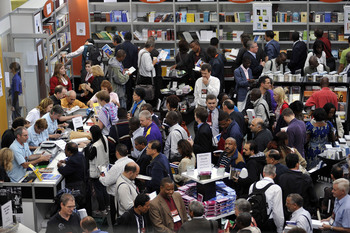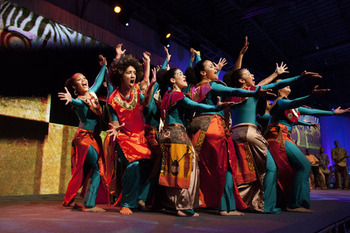After months of preparation, prayer, discussion and debate, more than 4,000 evangelical leaders have gathered in Cape Town, South Africa for the Third Lausanne Congress on Global Evangelization.
So now that they’re there, what exactly are the organizers and delegates in Cape Town hoping to accomplish?
One important goal of the Congress becomes clear when we notice how missionary conferences have changed over the years. This is a picture from the famous and influential World Missionary Conference 100 years ago in Edinburgh, Scotland:

This is a picture from Cape Town 2010.

Just for fun, here’s another one, from the opening ceremonies:

Over the past several years, it’s become apparent in the church that the Global South and East–Africa, Asia, and South America–have grown just as active in sending missionaries as they are in receiving them. Conferences like Cape Town are partially about making it clear that Christianity in the 21st century regards mission work as a fully global partnership.
“The church in the South tends to look at herself through the eyes of the North,” wrote Daniel Bianchi of Buenos Aires earlier this year as part of the Lausanne Movement’s Global Conversation. “When you convince someone that he needs help you also convince him that he can’t help others, somebody said. The church in the [South and East] needs to regard herself as valuable, capable and responsible as the rest of the church.”
But the Congress wants to do more than just make the statement. By bringing the delegates together in Cape Town, organizers hope that mission-minded Christians from across the world can get to know each other, become aware of the strengths, weaknesses, problems and opportunities apparent in every part of the world, and come to a common consensus and strategy on how missions is supposed to work in the next century.
That’s one of the reasons the conference has the word “Lausanne” in its name. The original Lausanne Conference–the First International Congress on World Evangelization, held in Lausanne, Switzerland in 1974 and organized by such influential evangelicals Billy Graham and John Stott–produced the Lausanne Covenant, a very influential missions manifesto which became “a rallying point for many evangelicals all around the world,” in the words of Chris Wright, chair of the Lausanne Theology Working Group. Claiming the original conference in their heritage, the organizers of Lausanne III hope to refresh the agenda for global evangelization.
“Just as Lausanne I produced The Lausanne Covenant and Lausanne II [in 1989] produced the Manila Manifesto, Cape Town 2010 will also produce a major document that we pray will help unite and guide the Church in the years to come by helping establishing missions and evangelization priorities,” writes Doug Birdsall, executive chair of Cape Town 2010.
One of the planks of the Lausanne Movement’s platform is that “evangelization requires the whole church to take the whole gospel to the whole world,” to quote the original Covenant. The “whole gospel,” according to Wright, means bringing to the world both God’s message of sin and redemption and God’s “passion against political tyranny, economic exploitation, judicial corruption, the suffering of the poor and oppressed, brutality and bloodshed.”
And we can only reach every part of the world, he adds, by utilizing every part of the church.
“None of us can engage in every area,” Wright writes. “That is why God created the church with a multiplicity of gifts and callings, so that we can, as a whole church bear witness to the whole gospel in the whole world.”
That, in a thumbnail, is the stated mission of Cape Town 2010.
(Photos courtesy Wikipedia, Lausanne Movement Flickr Photostream)







